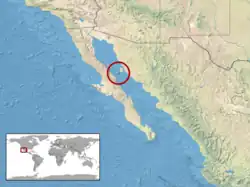Crotalus estebanensis
| Crotalus estebanensis | |
|---|---|
| Scientific classification | |
| Kingdom: | Animalia |
| Phylum: | Chordata |
| Class: | Reptilia |
| Order: | Squamata |
| Suborder: | Serpentes |
| Family: | Viperidae |
| Genus: | Crotalus |
| Species: | C. estebanensis
|
| Binomial name | |
| Crotalus estebanensis Klauber, 1949
| |

| |
| Location of San Estéban Island | |
| Synonyms | |
| |
Crotalus estebanensis, commonly known as the San Esteban Island rattlesnake,[3] is a pit viper species[4] endemic to San Estéban Island, Mexico. Like all other pit vipers, it is venomous.
Description
Adults grow to a maximum reported length of 98.2 cm.[3]
Geographic range
It s known only from the type locality,[3] which is "San Estéban Island, Gulf of California, Mexico.[2]
Conservation status
This species is classified as least concern on the IUCN Red List of Threatened Species (v3.1, 2001).[1] Species are listed as such due to their wide distribution, presumed large population, or because they are unlikely to be declining fast enough to qualify for listing in a more threatened category. The population trend is stable. Year assessed: 2007[5]
References
- ^ a b Frost, D.R. (2007). "Crotalus estebanensis". IUCN Red List of Threatened Species. 2007: e.T64317A12765597. doi:10.2305/IUCN.UK.2007.RLTS.T64317A12765597.en. Retrieved 11 June 2024.
- ^ a b McDiarmid RW, Campbell JA, Touré T. 1999. Snake Species of the World: A Taxonomic and Geographic Reference, vol. 1. Herpetologists' League. 511 pp. ISBN 1-893777-00-6 (series). ISBN 1-893777-01-4 (volume).
- ^ a b c Klauber LM. 1997. Rattlesnakes: Their Habitats, Life Histories, and Influence on Mankind. Second Edition. 2 volumes. Reprint, University of California Press, Berkeley. ISBN 0-520-21056-5.
- ^ "Crotalus estebanensis". Integrated Taxonomic Information System. Retrieved September 13, 2007.
- ^ 2001 Categories & Criteria (version 3.1) at the IUCN Red List
